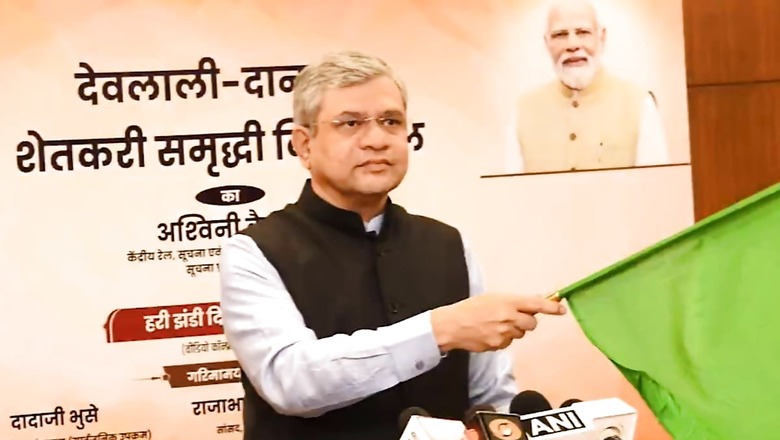
views
The Ministry of Railways continues its significant investments in Maharashtra, with Union Minister Ashwini Vaishnaw flagging off the “Shetkari Samruddhi” (farmer empowerment) train on Tuesday, hours before election dates were announced in the state. This new route, connecting Devlali to Danapur in Bihar, aims to facilitate the transportation of agricultural produce, addressing a critical need for Maharashtra’s farmers.
This initiative comes on the heels of a meeting between Minister Vaishnaw and a group of farmers in early October, highlighting the government’s responsiveness to their concerns. The transport of perishable goods, particularly fruits like mangoes, grapes, and onions, is crucial for Maharashtra’s farmers, who rely heavily on exports. This new train echoes the “Kisan Rail” project piloted during the Covid-19 pandemic, demonstrating a continued commitment to supporting the agricultural sector.
“From the farms on the banks of Godavari to the markets on the banks of Ganga – a unique confluence of food-providers and the launch of rail service. The demand of the farmers of Nashik was fulfilled today by running the Shetkari @RailMinIndia special train,” the minister wrote on social media platform X.
This latest initiative is just one example of the substantial investment the Union government has made in Maharashtra’s railway infrastructure. The budgetary allocation for railways in the state has increased thirteenfold since 2014, soaring from Rs 1,171 crores to a staggering Rs 15,940 crores in the 2024-25 budget. This surge in funding reflects the “double-engine” growth strategy, with both the central government under Prime Minister Narendra Modi and the state government led by Eknath Shinde and Devendra Fadnavis prioritising infrastructure development.
This investment has yielded impressive results. Between 2014 and 2024, Maharashtra witnessed the construction of 1,830 km of new railway tracks and the electrification of 3,513 km of existing lines, achieving near-total electrification. Furthermore, proposed railway projects spanning 980 km are projected to generate significant employment opportunities.
One of the most anticipated projects is the Mumbai-Ahmedabad High-Speed Rail corridor, India’s first bullet train project. This ambitious undertaking, with a projected cost exceeding Rs 33,000 crores, will cover 156 km in Maharashtra. The arrival of the first bullet train from Japan is eagerly awaited in January next year. Despite initial land acquisition hurdles, the project gained significant momentum under the current state government’s focused approach to infrastructure development.
Beyond the bullet train, the expansion of the Vande Bharat network, India’s semi-high-speed train service, is transforming connectivity within Maharashtra. The state got its first Vande Bharat train in September 2022 to run between Mumbai Central and Gandhinagar. Eleven pairs of Vande Bharat trains now operate across the state, connecting major cities like Mumbai, Nagpur, Pune, and Kolhapur, as well as providing links to neighboring states. This expansion aligns with the “Make in India” initiative, promoting domestic manufacturing and technological advancement.
Apart from this, 928 rail flyovers and underbridges have been constructed. The construction of 318 such underbridges and flyovers, being built at the cost of Rs 5,615 crore, is underway.
The railway modernisation drive extends to enhancing the commuter experience. The redevelopment of 132 railway stations across Maharashtra under the “Amrit Stations” scheme, with an estimated cost of Rs 6,400 crores, will significantly improve passenger amenities and infrastructure. This initiative will benefit major stations in Mumbai, including Chhatrapati Shivaji Maharaj Terminus, Bandra Terminus, Dadar, and Borivali, as well as stations in other key cities like Nagpur, Nashik, and Solapur.
Recognising the importance of Mumbai’s local train network, the “lifeline” of the city, several expansion projects are underway. These include the extension of the Harbour Line from Goregaon to Borivali, the expansion of the Virar-Dahanu line, and numerous other projects totaling over Rs 16,240 crores. These initiatives aim to reduce congestion and improve connectivity within the Mumbai Metropolitan Region.
Furthermore, the Western Dedicated Freight Corridor (DFC), a 1,506 km long project, is nearing completion. The 176 km stretch in Maharashtra, currently at 50 per cent completion, is crucial for ensuring smooth and efficient cargo transportation, further boosting economic activity.
The Indian Railways has also demonstrated its commitment to serving the people of Maharashtra by running special trains during festivals and events. This year, over 342 special trains were operated during the Ganpati festival, and 13 special trains facilitated travel to Deekshabhoomi in Nagpur, showcasing the railways’ responsiveness to passenger needs.
The transformation of Maharashtra’s railway network under the “double-engine” government is undeniable. The significant investments, coupled with a focus on infrastructure development and passenger convenience, have ushered in a new era for rail travel in the state. These advancements are not only improving connectivity but also driving economic growth and enhancing the quality of life for the people of Maharashtra.
















Comments
0 comment